
Roger Hill, a fisherman from Colorado Springs, thinks the public should be able to wade on the bed of the Arkansas River as it passes private property because it's a state-controlled natural resource. But the Colorado Supreme Court said he doesn’t have the legal standing to make that case, only the state does.
Hill’s attorney, University of Colorado law professor Mark Squillance, said that forces his client and others to break the law to be able to take this claim to court.
“Because once you're arrested, you're allowed to defend yourself on the grounds that you have a legal right to be there,” he said.
Colorado law is narrow and problematic regarding riverbed access, according to Squillace.
Questions around that and the issue of public access to Colorado’s waterways go back decades. Resolution hinges on whether the state controls the riverbed, which is not clear according to the court.
This particular dispute began when the property owners along a stretch of the Arkansas River allegedly threw rocks at Hill when he waded past their property to fish. They said he was trespassing.
According to the court documents, private ownership of the land abutting the river where Hill wants to fish can be traced back to a federal land grant.
Hill’s position is that the Arkansas River was navigable when Colorado first became a state in 1876 and therefore the state controls the river bed.
Justice Melissa Hart wrote the court’s opinion:
“This dispute has produced hundreds of pages of briefing,” she wrote. “The subjects (of those briefings) are ultimately irrelevant to the issue before us. Rather, this case requires us to answer just one question: whether Roger Hill has a legally protected interest that affords him standing to pursue his claim...”
“He does not,” she wrote. “Hill has no legally protected right independent of the State’s alleged ownership of the riverbed onto which he can hook his declaratory judgment claim.”
Squillace said the judgment is disappointing, but “on the positive side, this does nothing to end our campaign to assure that the public has access to our navigable waterways in Colorado.”
He said they are deciding their next steps. It’s possible they’ll ask the court to reconsider its decision.









